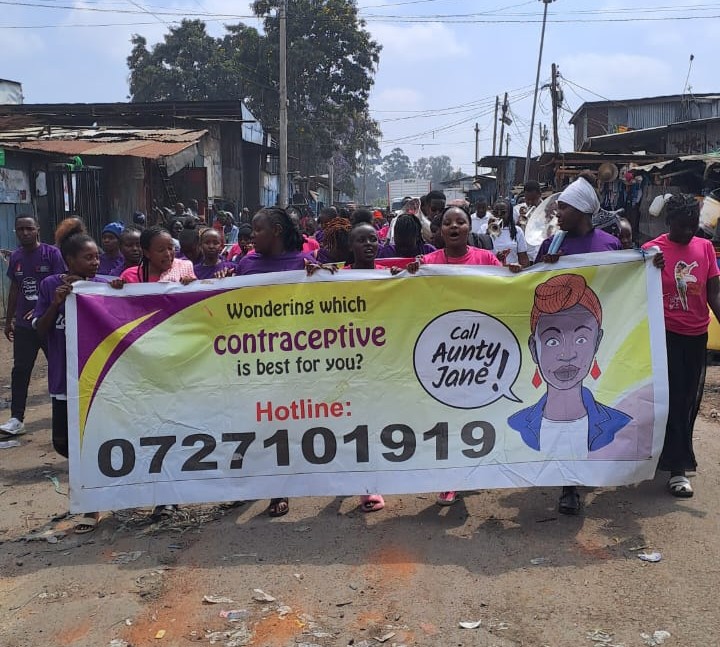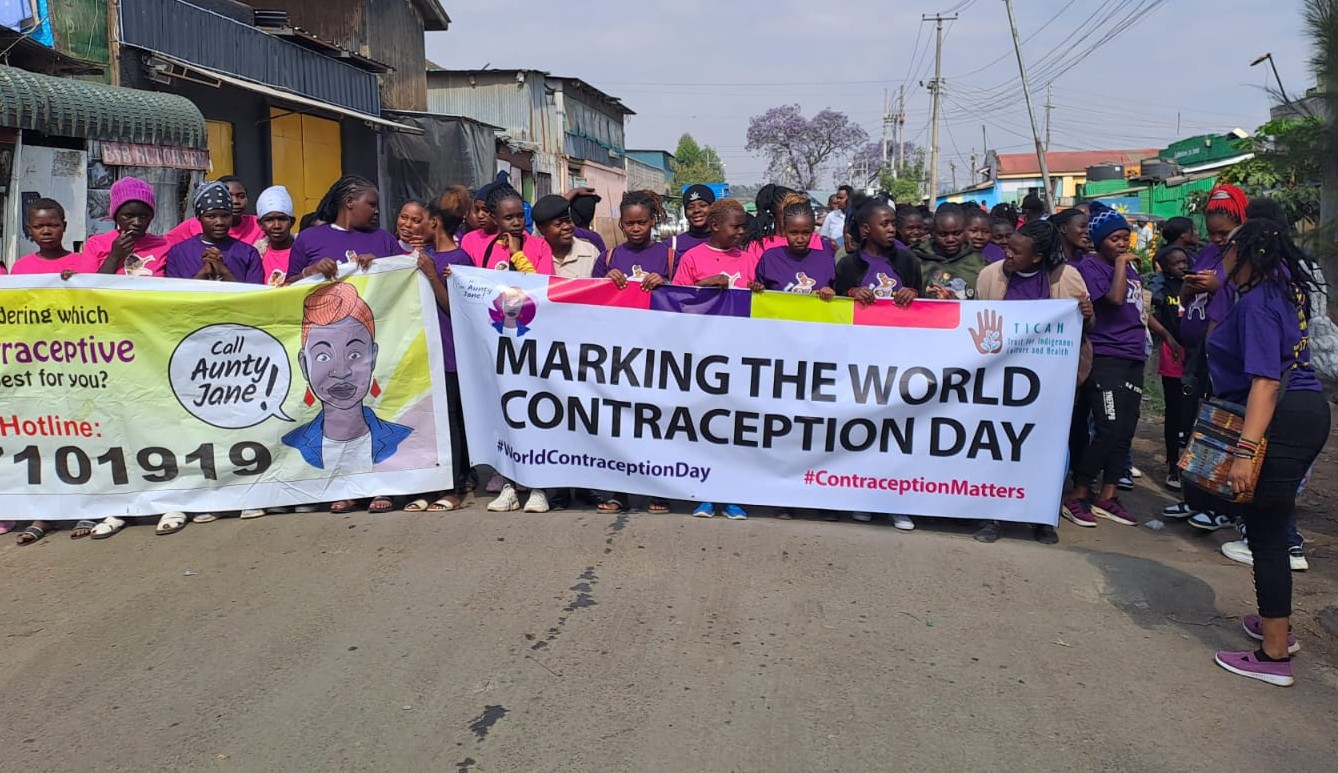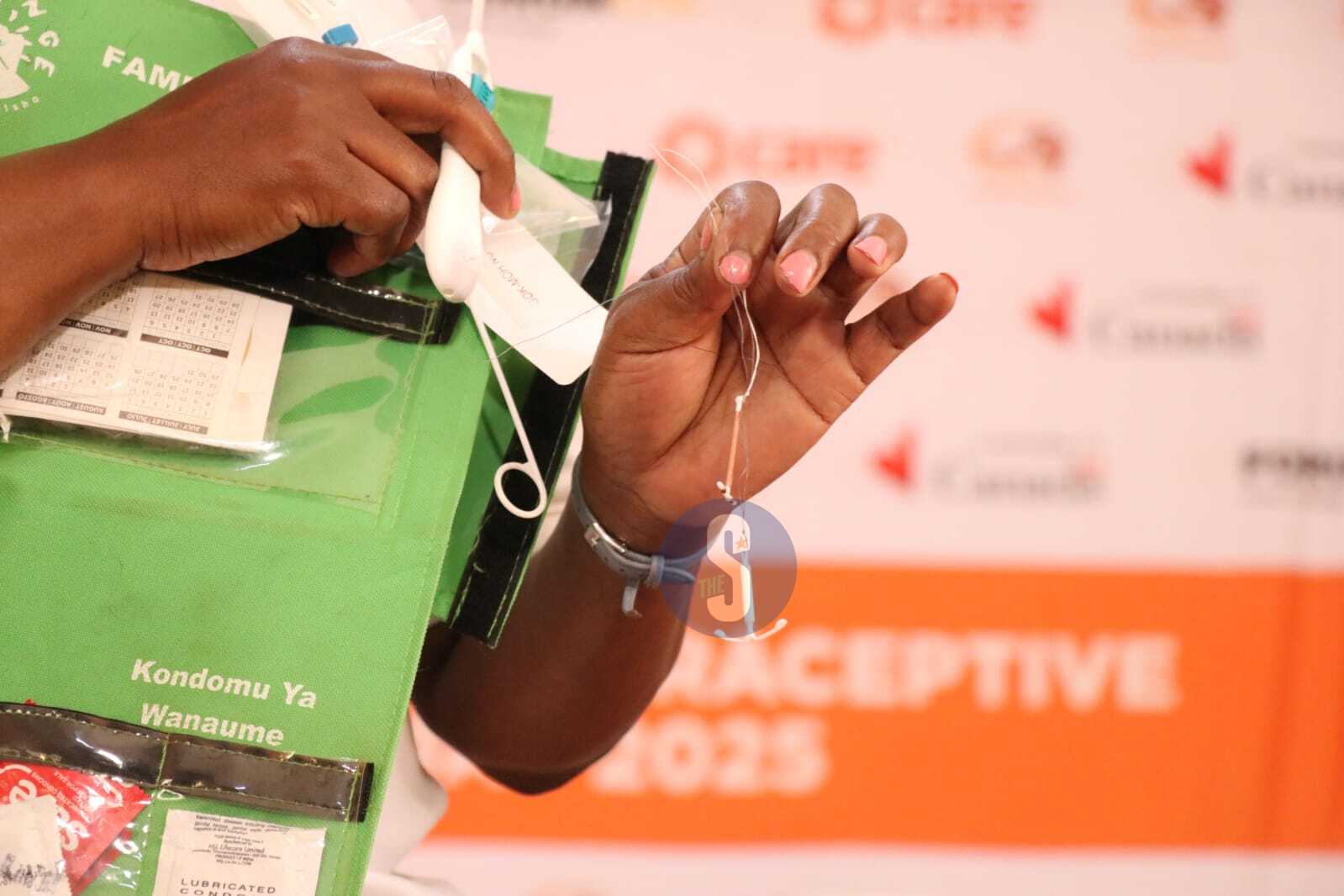
 Young mothers and other stakeholders mark World Contraceptives Day 2025, during a march in Shauri Moyo on September 26, 2025 /COURTESY
Young mothers and other stakeholders mark World Contraceptives Day 2025, during a march in Shauri Moyo on September 26, 2025 /COURTESYAt 19, Stellamaris from Mukuru had just finished high school and was preparing to join college when she became pregnant.
Around the same age in Kibra, Joyline discovered she was expecting her first child in September 2024. Both young women watched their plans for further studies stall under the weight of early motherhood.
“I didn’t know where to start. I was very young, and it was hard to accept it,” Stellamaris says.
For Joyline, the challenge was compounded at home. Her father wanted her to terminate the pregnancy so she could return to school, but she refused.
“Before, I didn’t think about family planning much. I had dreams of going to college to study nursing, but pregnancy interrupted them,” she says.
The two mothers are among many young women in Nairobi’s informal settlements whose lives have been shaped by unintended pregnancies.
According to the 2022 Kenya Demographic and Health Survey, 40 per cent of Kenyan women say they do not want more children, and teenage pregnancies have dropped from 18 to 15 per cent since 2014. Yet gaps in access to contraceptives remain.
Stellamaris only learned about family planning when she joined the Trust for Indigenous Culture and Health (TICAH) in 2023.
“They taught us more about family planning and gave us the courage to go to a facility and access it because it’s our right,” she says.
Today, Stellamaris works as a facilitator, speaking in schools and guiding other young mothers. She also uses contraception, with the support of her partner.
“My partner wants two children, but not now. We are not yet financially stable, so he is comfortable and supports the use of contraceptives until we can provide for our future children,” she explains.
On her part, Joyline was introduced to contraceptives through TICAH mentors.
“They connected us with doctors who explained more about contraceptives,” she says.
Access, however, has not always been smooth.
“Sometimes there are long queues or we are told that we are too young to use family planning methods," she says.
Joyline, who is preparing to return to school [college], is currently taking a short course in automotive mechanics.
According to the two young mothers, stigma remains a heavy burden when it comes to access to contraceptives.
“The community should stop judging us. We know we got pregnant when we were young, but they should accept us and allow us to participate in family planning methods,” Stellamaris says.
On her part, Joyline stresses that awareness must include parents.
 Young mothers and other stakeholders mark World Contraception Day 2025, during a march in Shauri Moyo on September 26, 2025 /COURTESY
Young mothers and other stakeholders mark World Contraception Day 2025, during a march in Shauri Moyo on September 26, 2025 /COURTESY
As the world marks World Contraception Day, Joyline has a message for her peers: "Before engaging in sex, think about the future. Avoid unintended pregnancies by using contraceptives. At first, embracing and using contraceptives may seem difficult, but with time and knowledge, it becomes easier."
“We also need medical camps and open conversations on sexual and reproductive health in the community, even with parents. The government and society should embrace contraceptives, not judge us,” she says.
For Stellamaris and Joyline, the lesson is clear. They want honest conversations in the community, leaders held accountable, and clinics fully stocked with trained, youth-friendly providers.
“If our parents had talked to us and encouraged us to attend forums on family planning education, we wouldn’t have reached this point,” Stellamaris says.
Looking back, Stellamaris appreciates the support she has found.
“I really value what we do. We learn, mingle, and share. It gives us the courage to talk, and it shows the government what we need,” she says.
As World Contraceptive Day is marked, she emphasises the importance of partnerships and safe spaces.
“We need platforms to encourage girls, to empower them, and to embrace them,
whether they are already mothers or sexually active at a young age. We cannot
pretend it’s not happening. What we must do is give them knowledge and power," she says.
“The community must also stop judging us. We now know better.”
On her part, TICAH’s Program Coordinator, Mickreen Adhiambo, says young mothers engaging with policymakers, county health officials, local administrators, and service providers is a critical step toward addressing systemic barriers.
“For too long, when a young woman walked into a facility, the first questions were: Are you married? How old are you? That prevented many from accessing the comprehensive sexual reproductive health information and services they needed,” she explains.
According to Adhiambo, they work with young mothers in areas such as Korogocho, Viwandani, Kawangware, Majengo, and Kibra, where they tackle the “triple threat”: gender-based violence, teenage pregnancies, and HIV.
"We help these young mothers by integrating them into different programs that link reproductive health to socioeconomic empowerment. Some young mothers receive scholarships, while others join vocational training in fields like beauty, mechanics, and technical skills," she says.
“The young mothers are now shaping their own futures."
According to Adhiambo, this year's World Contraception Day is special because young
mothers are engaging directly with policymakers, county health officials, local
administrators, and service providers.
She says the aim is to challenge systemic barriers such as negative attitudes among health workers.
While sometimes stigma persists, she acknowledges that strides have been made.
"Community health promoters are now bringing services closer to families, and more facilities now offer youth-friendly services. Budget allocations for reproductive health remain inadequate, and there are gaps, but the improvements are visible," Adhiambo says.
On the frontline, nurse Catherine Kanuna at Riruta Hospital sees the impact of progress, while still noting some persistent challenges.
“Girls are now bold enough to come forward, consent, and choose methods for themselves. The trend is positive,” she says.
 Intrauterine devices (IUDs), a form of birth control for women/LEAH MUKANGAI
Intrauterine devices (IUDs), a form of birth control for women/LEAH MUKANGAIHowever, she notes that myths and misconceptions remain common.
According to Kanuna, some believe contraceptives lower libido, while others think intrauterine devices (IUCDs) or implants can move inside the body or even come out during menstruation.
Kanuna says these are false beliefs that continue to discourage some young women from seeking services, but says when young mothers seek these services, they ensure they get the right information.
To guide young mothers on the choice of contraceptives, Kananu says healthcare workers rely on medical criteria and individual body responses to determine the best family planning method.
“Not everyone can use the same method, so both the criteria and the client’s
body guide us,” she says.
She recalls the case of a girl who gave birth at 15 but was denied family planning because both society and medical practitioners considered her too young.
Years later, perceptions have changed, especially from the community and health workers, and finally, young mothers can access contraceptives
“That shows progress,” Kanuna says.
“Today, even those under 18 can walk into a facility and boldly request a method.”
Her message to young mothers is simple: be bold. “Go to a facility and ask
for contraception because it’s your right and it’s good for your health,” she
urges.
She also calls on the government and parents to do more.
“The government should build capacity, sensitise communities, and give young people the information they need. Parents must also support their daughters,” she says.
For Kanuna, ignoring the reality of teenage sexuality is no solution.
“At 16, some are already sexually active. Denying them access only puts them at risk. They have a right to the correct family planning methods, and they should access them whenever they feel it's right for them,” she stresses.














